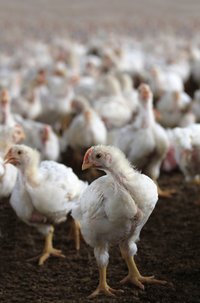Ensiled kernel maize improves broiler welfare
A lower mortality rate and improved footpad health and meat quality of broilers are some of the positive effects of using ensiled kernel maize in broiler feed, according to results from a PhD study at the Department of Animal Science, Aarhus University.

Similar to other fermented products, ensiled kernel maize is characterized by a low pH, high lactic acid and acetic acid contents and a large number of lactic acid bacteria. Ensiled kernel maize has successfully been used in pig production with positive effects both on pig intestinal health and production results, but has not previously been studied in broiler production.
Samir Ranjitkar explored in his PhD study the effect of a maize-based feed containing 15% ensiled kernel maize on broiler production performance, nutrient digestibility and bird welfare.
Improved welfare and meat quality
The results show that this feeding strategy has a number of positive effects, for example on welfare, without adversely affecting the growth rate. The mortality rate decreased for the broilers fed the maize grain silage while litter quality and footpad health improved. Meat quality measured in tenderness and juiciness was also positively affected. This feeding strategy can therefore be recommended.
The research results also help to understand the influence of ensiled kernel maize on nutrient digestibility and gastro-intestinal health in broilers. New knowledge was finally generated about the age-related development of the gastro-intestinal microbiota in broilers.
Further information
The PhD study was conducted by Samir Ranjitkar at the Section for Immunology and Microbiology at the Department of Animal Science, Aarhus University.
The full PhD thesis can be downloaded from here.
